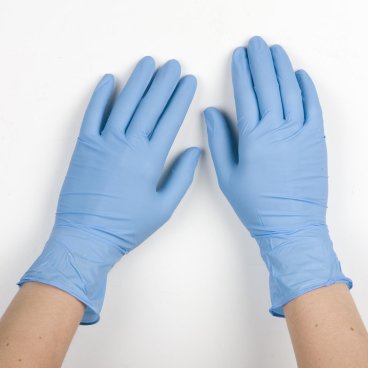In the food industry, safety and hygiene are paramount. Whether it’s during food processing, packaging, or handling, protecting both the food products and the workers is essential. One often-overlooked yet critical piece of equipment that plays a major role in ensuring safety is protective gloves.
The right gloves can help prevent contamination, avoid chemical exposure, and ensure a hygienic environment for both workers and food. Among the various options available, nitrile gloves stand out as the top choice for many food industry professionals. Let’s take a closer look at why nitrile gloves are the ideal solution for food handling and food processing operations.
1. Latex-Free: A Safer Choice for Everyone
One of the primary concerns in choosing gloves for food handling is latex allergies. While latex gloves have long been a popular choice for personal protection, they can cause allergic reactions in some workers. These reactions can range from mild skin irritations to severe anaphylactic responses, which can significantly impact productivity and workplace safety. Nitrile gloves, on the other hand, are made from synthetic rubber and are completely latex-free, eliminating the risk of allergic reactions. This makes them a safer and more inclusive option for all workers, especially in environments where employees may have sensitivities or allergies to latex. With nitrile gloves, businesses can ensure that all employees are protected, while also maintaining high standards of food hygiene.
2. Superior Chemical Resistance: A Shield Against Oils, Acids, and Solvents
Food processing environments often involve handling various chemicals, oils, and acidic substances, especially in cleaning, sanitizing, and food preparation processes. Traditional gloves may not provide sufficient protection when exposed to these substances, leading to potential contamination of food or the degradation of the gloves themselves. Nitrile gloves are known for their excellent chemical resistance, offering protection against a wide range of oils, acids, alkalis, solvents, and other harsh chemicals commonly used in food production. Whether you’re working with greasy food items, cleaning agents, or acidic substances in food preservation, nitrile gloves help prevent chemical exposure and contamination, making them an essential tool in ensuring both worker safety and food integrity.
3. High Durability: Long-Lasting Protection for Every Task
When it comes to selecting gloves for food industry workers, durability is a critical factor. Food processing and food service tasks often require gloves to withstand repeated use and exposure to rough surfaces, sharp objects, and frequent hand movements. Nitrile gloves offer superior puncture resistance and tear strength, ensuring they last longer without compromising their protective function. Unlike latex or vinyl gloves, which can tear or break more easily under stress, nitrile gloves maintain their integrity, even in demanding tasks such as meat processing, bakery production, or high-volume food preparation. This durability translates to fewer glove changes during shifts, reducing overall glove consumption and costs while improving workplace efficiency.
4. Oil and Grease Resistance: Ideal for Food Preparation and Handling
In the food industry, workers frequently deal with oily and greasy substances, whether it’s in food processing, cooking, or packaging. Many gloves fail to offer sufficient protection against oils and greases, which can permeate the glove material and cause discomfort, contamination, and decreased performance. Nitrile gloves, however, provide excellent resistance to oils and fats, keeping the inside of the glove dry and comfortable. Their oil-resistant properties prevent grease from seeping through, making nitrile gloves a go-to choice for employees working with fatty foods, oil-based cooking methods, or during cleaning tasks that involve greasy residues. By using nitrile gloves, you can ensure a clean, hygienic environment and maintain the safety and quality of the food you’re handling.

5. Comfort and Flexibility: Maximizing Worker Productivity
Another important consideration when choosing gloves for food handling is comfort. Workers in the food industry often need to wear gloves for extended periods, so comfort is crucial to ensure productivity and minimize discomfort. Nitrile gloves are designed to offer excellent stretchability and flexibility, providing a snug fit without restricting movement. This comfort allows workers to perform detailed tasks such as food preparation, packing, and serving with ease. Additionally, the textured fingertips of nitrile gloves offer enhanced grip, making it easier to handle food items, kitchen tools, and equipment with precision and control. With a high level of dexterity, workers can focus on the task at hand, reducing the risk of errors and enhancing overall efficiency.
6. Food Safety: Ensuring Hygiene and Compliance with Industry Standards
Food safety is a critical aspect of any food business, and gloves play a key role in preventing foodborne illness and contamination. Nitrile gloves are widely regarded as food-safe and are often certified by food safety standards, including the FDA (Food and Drug Administration) in the United States. This certification ensures that nitrile gloves meet rigorous safety requirements and are suitable for use in environments where direct contact with food is required. Using FDA-approved nitrile gloves helps companies comply with food safety regulations and gives consumers confidence that the food they consume has been handled safely and hygienically.
7. Eco-Friendly and Sustainable: Protecting the Planet
As sustainability becomes an increasingly important issue in many industries, the food sector is also focusing on eco-friendly practices. Nitrile gloves, although made from synthetic rubber, are often recyclable and more environmentally friendly than other types of gloves. Many manufacturers now produce nitrile gloves with eco-conscious processes and materials, ensuring that they meet environmental standards without compromising on performance. By choosing nitrile gloves, food businesses can help reduce their environmental footprint while still maintaining high levels of safety and hygiene in their operations.
8. Easy to Use and Cost-Effective
Aside from the technical benefits, nitrile gloves are also practical and cost-effective. They are easy to use, easy to don and remove, and require no special maintenance or care. Available in a variety of sizes and thicknesses, nitrile gloves can be selected based on the specific needs of the job, whether it’s for light-duty tasks or heavy-duty protection. Moreover, their cost-effectiveness means that businesses can maintain high safety standards without incurring excessive costs. The combination of durability, comfort, and versatility ensures that nitrile gloves are a sound investment for food businesses looking to improve their workplace hygiene and safety without overspending.
Protecting Workers and Consumers Alike
When it comes to the food industry, protective gloves are more than just an accessory—they are an essential part of the overall safety and hygiene protocol. Nitrile gloves offer the perfect balance of protection, comfort, and performance, making them the ideal choice for food industry workers. Their latex-free composition, chemical resistance, durability, oil resistance, and FDA approval ensure that both workers and consumers are protected from contamination and health risks. Moreover, their eco-friendly design and cost-effectiveness make them a smart and responsible choice for businesses committed to sustainability and safety.

Essential safety tools like fume hoods, gloves, and protective eyewear to ensure lab safety.
By choosing nitrile gloves, food businesses can ensure that their employees are well-protected, their food is handled safely, and their operations comply with the highest standards of hygiene. Nitrile gloves provide peace of mind for both workers and consumers, helping to maintain the integrity of food products and the health of those who enjoy them. Make the switch to nitrile gloves today—because safety, comfort, and hygiene should never be compromised in the food industry.

